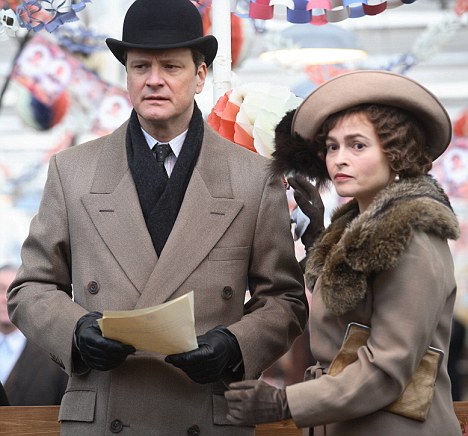
Mindfully stimulating if safely neutered story is bolstered by a memorably resilient and snippy performance. The King’s Speech is about a king who could not speak in public and the speech therapist who taught him facility. Colin Firth (“Love Actually”) becomes the newly defaulted King George VI, and although his stutter is credibly defective it is nevertheless the uppity big-headedness in the way he behaved – to cover-up his boy-like insecurities – that makes the performance a revelation. To present his authority, he thinks he has to act stuffy. Geoffrey Rush (“Shine”) is Lionel Logue, and while the character diagram would seem predictable it is nevertheless unpredictable in how he used reverse psychology nudging and parental techniques – to not just be a voice trainer but a shrink – that makes him a swell teacher and conductor. The scene is the eve of World War II, inducing the need of powerful men to rally the people through compelling speech.
King George VI is not a powerful man, at least behind closed doors he didn’t see himself as so. Helena Bonham Carter does fine, understated work as the patient Elizabeth – who sets up her husband’s appointments and coaxes him to accept coaching from speech therapist professionals. The king is simply Bertie at home, and he had a (slightly) easier time telling his children bedtime stories without tripping over his tongue. He can’t talk easy either to his brother Edward (Guy Pearce) who renounced the throne to chase taboo American love.
To make this film true, it requires many scenes in rooms behind closed doors. On rare occasion the film takes us outdoors to the landscapes of the malleable populace of Great Britain. Bertie confesses, in a gesture of self-recognized humility, his flawed detachment that he doesn’t know anything about the common man and that Lionel is the only common man he has ever met (Lionel does quite well for a family man provider). Bertie prefers a lifetime staying within protective walls where he cannot be judged by outsiders. Except you wonder why director Tom Hooper (“The Damn United”) could not have at least provided shots of Bertie riding in his chauffeured automobile through urbania to observe the common man, and England, from within his car.
The film’s strengths rely on talk and performance, and the impediments within. The final chapters deal with Bertie gathering the confidence and polishing his pronunciation to deliver a radio address to a nation on the verge of war and inspire the masses. Lionel is asked by several pigheaded authority figures to step aside, but Bertie maintains that he is a much-needed friend (by the end they will remain in promise friends for a lifetime). The big speech, with only Bertie and Lionel in chamber, is one that might guarantee Firth a chance at a future Oscar speech. However, what is never addressed is the fact that King George did not write the speech, as we never meet the speechwriters. The King has reason to be proud of his radio performance perhaps, but did he fully appreciate the eloquent verses invested in the speechwriting?
The acting has some great nuances that speak volumes of truth. Regardless of its shortcomings, you look at past history with new eyes. Firth and Rush take on speech calamity and turn it into something moving, and naturally funny. If you have the eyes of a psychologist it might rivet further analysis.
111 minutes. Rated R.




